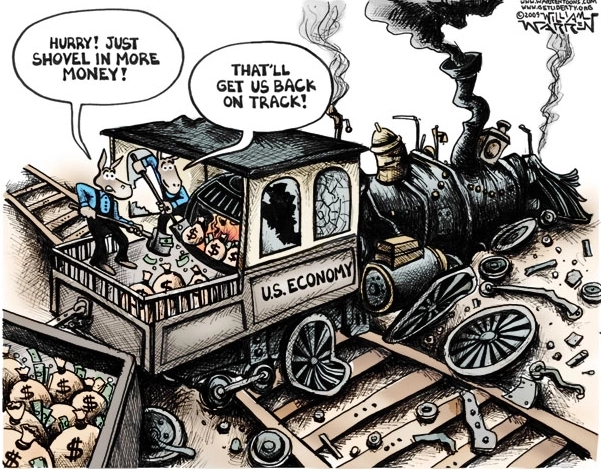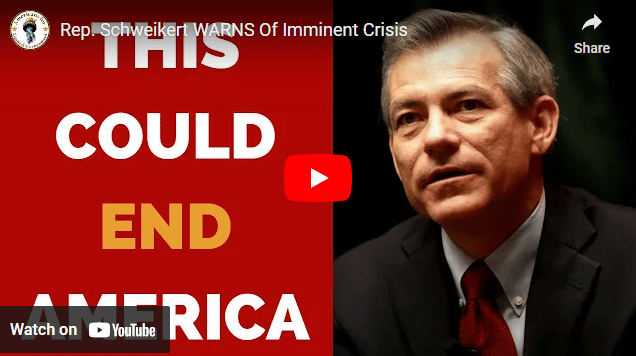Jan. 30, 2023
Permission to republish original opeds and cartoons granted.
With spending up $1.4 trillion since 2019 for Covid and the debt ceiling looming, it’s now or never for Congress to cut spending

By Robert Romano
Discretionary spending has increased $356.6 billion since Fiscal Year 2019 in response to the Covid pandemic in 2020 and increases in transportation and defense spending, according to data compiled by the White House Office of Management and Budget (OMB), a 26 percent jump, to $1.7 trillion.
This includes an $89.8 billion increase in defense spending (up 12.9 percent), a $29 billion increase in transportation (up 31.2 percent), a $44.5 billion increase in education spending (up 62 percent) and a $55 billion increase in health spending (up 62 percent).
That comes atop a $1 trillion increase in so-called mandatory spending to $4.1 trillion. That’s actually down from 2021, when it was $5.1 trillion, as much of the increased temporary Covid spending that included expanded unemployment benefits, checks to households and other one-time benefits that are coming to an end.
All told, that’s a $1.4 trillion increase in spending since 2019 to $5.8 trillion, from $4.4 trillion before the pandemic.
But believe it or not, that still does not include all the spending that was included in the 2022 additional budget measures in the so-called Inflation Reduction Act, with $369 billion for green energy subsidies and tax credits, including $85 billion for electric vehicle subsidies.
That represents a target rich environment for House Republicans hoping to restore any semblance of fiscal sanity in Washington, D.C., as House Speaker Kevin McCarthy (R-Calif.) looks to leverage the national debt ceiling, now set at $31.4 trillion.
U.S. Treasury Secretary Janet Yellen has previously warned that the U.S. debt ceiling would come due on Jan. 19, as so-called “extraordinary measures” of refinancing the debt up to the current limit have ensued since then.
The debt ceiling legislation was last increased in Dec. 2021 by $2.5 trillion when Democrats controlled both the House and the Senate, to accommodate these massive increases in spending.
Now, Republicans have the majority in the House, meaning they get a say just like in 2011, and the result was discretionary spending caps, known as budget sequestration, that limited the growth of defense and non-defense discretionary spending, saving hundreds of billions of dollars.
As a result, the budget deficit was brought from $1.3 trillion in 2011 all the way down to $441 billion in 2015, the year Republicans won back the U.S. Senate. From there, the practice was terminated, and the budget deficit again ballooned, reaching $983 billion by 2019.
That was before Covid. In 2020, a record $3.1 trillion deficit, according to data compiled by the White House Office of Management and Budget. $2.7 trillion in 2021. $1.4 trillion in 2022.
All told, more than $6 trillion was printed, borrowed and spent into existence to offset the global economic lockdowns that temporarily disabled labor markets’ functionality as citizens were told to remain in their households.
Now, with the 25 million jobs that were lost to Covid all recovered (16 million before Biden ever took office) and the unemployment rate down to 3.5 percent, whatever excuse there was for all the spending is gone. We don’t need it anymore.
And with another recession looming thanks to all the inflation caused by all of the spending plus the production halts from Covid via economic lockdowns, and the further supply disruptions from Russia’s invasion of Ukraine, that means now is the time cut spending. What will happen if and when the unemployment rate begins rising again is Congress will turn around and want to boost aggregate demand again via even more spending. It happens every time.
Already House Speaker McCarthy has said he is open to this possibility, looking to freeze spending at 2022 levels. That means rolling back the green spending, as well as the stepped up Internal Revenue Service enforcement including the additional 87,000 IRS agents put in place by Biden and last year’s Democratic-controlled Congress, and creating another years-long plan to reduce the budget deficit to more sane levels.
In truth, with no other must-pass pieces of legislation coming up any time soon—Congress can keep kicking the can on appropriations with continuing resolutions—the reality is there is no other way. It’s now or never.
Robert Romano is the Vice President of Public Policy at Americans for Limited Government.
Video: Rep. Schweikert WARNS Of Imminent SPENDING Crisis

To view online: https://www.youtube.com/watch?v=svXvMgJ1fcY
Americans for Limited Government Praises Senators Tom Cotton, Rick Scott, Ted Budd and JD Vance on bill to Strip China's Permanent Trade status

Jan. 30, 2023, Fairfax, Va.—Americans for Limited Government President Rick Manning today issued the following statement reacting to the bill introduced to Strip China's Permanent Trade status:
"China has been engaged in a multi-front war on the United States for more than a decade that has been largely financed through the most favored nation status, also known as Permanent Normal Trade Relations PNTR) trade classification, passed by Congress and signed by President Bill Clinton in 1998. This mistake had the effect of transferring trillions of dollars in wealth and much of the United States manufacturing sector to China leaving America vulnerable. The hope and promise were that this interdependency between our two economies would forge an alliance between our nations. Instead, it has led to a hollowing out of our national industrial base and China's ascendancy on the world stage.
"Americans for Limited Government applauds Senators Tom Cotton, Rick Scott, Ted Budd and J.D. Vance for taking the courageous step to introduce legislation to end PNTR.
"It can be predicted that some of the multi-national manufacturing sector who have invested heavily in factories in China while leaving American workers behind will object. They would be wrong. It is akin to committing national suicide to continue encouraging imports from China, a country whose biggest export to the United States over the past few years has been the COVID-19 virus. China has become a disastrously bad business partner as government manufacturing shutdowns have wreaked havoc on the world's economy. This is not even to mention that China has used this increased engagement to steal hundreds of billions of dollars in intellectual property, is the largest polluter in the world and have engaged in human rights abuses ranging from extreme religious persecution, using forced and child labor, and engaging in forced organ transplants using political and religious prisoners as unwilling organ donors.
"China was given a twenty-five-year chance to become a reliable, morally sustainable partner and they have abused their favorable trade status. Congress has no choice but to revoke the communist government's favored access to the U.S. economy. It is time for Congress to pass the China Trade Relations Act."
For media availability contact Americans for Limited Government at [email protected].
